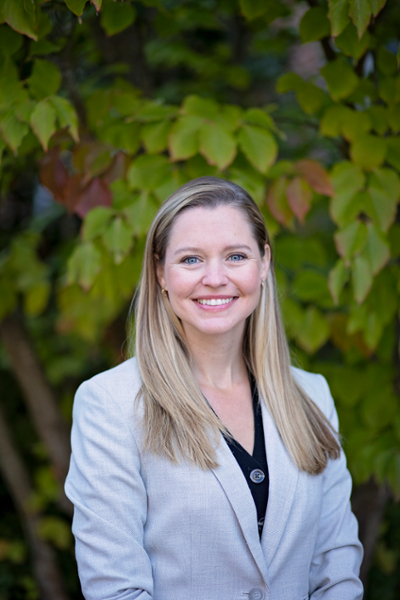Published on November 3, 2021 by Morgan Black

New research by Kate McCombs, assistant professor of management, has been selected for publication by the Leadership & Organization Development Journal. Her article, “The resilient effects of transformational leadership on well-being: examining the moderating effects of anxiety during the COVID-19 crisis,” examines organizational performance and the relationship between employee well-being and transformational leadership during the pandemic.
McCombs coauthored the article with Ethlyn Williams, associate professor of management at Florida Atlantic University. Together they examine transformational leadership, one of the most studied leadership styles, during the coronavirus pandemic, to better understand the impact of transformational leadership on employee’s well-being during an extreme crisis. Further, they examine the differences in these relationships based on employee’s gender. For the study, they collected data from 212 working individuals of various backgrounds who responded on their level of COVID-19 anxiety and leadership experiences at different time frames during the pandemic.
Among many things, the authors’ findings unveiled that COVID-19 anxiety weakened the influence of core transformational leadership behaviors and intellectual stimulation on well-being for females only. Their findings extend research by capturing an external shock to better understand transformational leadership in an extreme crisis context, the influence on employee’s well-being and the impact gender has on this relationship.
McCombs said, “Why I found this study so interesting is because we were able to better understand what organizations can do to help mitigate the negative impact a crisis, in this case the pandemic, has on employee’s overall well-being. We find that certain transformational leadership behaviors even during a crisis are resilient, holding a positive impact on employee’s well-being even during a crisis, while others are not. Further, we were able to examine this based on gender. COVID-19 may have placed a larger time and emotional burden on women, and therefore what is effective for male employees is not the case for females. Better understanding what is impactful, or not, during a crisis can prepare leaders for future crises and better enable leaders to be an asset, not a hindrance, during a time of immense anxiety and stress.”
Samford is a leading Christian university offering undergraduate programs grounded in the liberal arts with an array of nationally recognized graduate and professional schools. Founded in 1841, Samford is the 87th-oldest institution of higher learning in the United States. Samford enrolls 6,101 students from 45 states, Puerto Rico and 16 countries in its 10 academic schools: arts, arts and sciences, business, divinity, education, health professions, law, nursing, pharmacy and public health. Samford fields 17 athletic teams that compete in the tradition-rich Southern Conference and ranks with the second highest score in the nation for its 98% Graduation Success Rate among all NCAA Division I schools.

